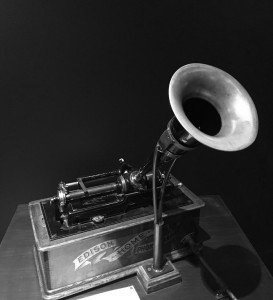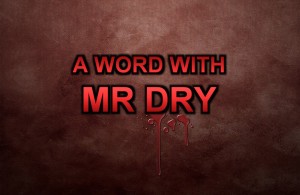The following interview has been transcribed from a series of Edison celluloid phonograph cylinders, which were found during construction of a new shopping centre in central London. During excavations, workmen uncovered the cellars of the defunct Chelsea Evening Herald & Gazette, a newspaper which survived until war-time paper shortages closed it in 1940.
The cylinders themselves have been dated to around 1910 by examination of the celluloid, which tallies with the information contained on them and other small details. The label on one cylinder bears the name Geo. Kensington, a reporter known to have worked with the Herald and Gazette during the first decade of the 20th century. Below that it says only ‘Interview with D.’ in the same handwriting.
We are grateful to Lambert Electro-Phonics of Guildford for their assistance in recovering the recordings. We have not indicated where cylinders were changed during the interview.
THE RECORDING
<Brief irrecoverable section at start of first cylinder>
First Voice (presumably Kensington): …of the Herald & Gazette. I am joined in this nondescript boarding house by Edwin Dry, known to many as the Deptford Assassin. For the benefit of rival papers, certain information has been provided which make us confident that our interviewee is the genuine article.
Second voice (presumably Dry): Or a well-informed impostor.
Kensington: We are satisfied. Although, for the benefit of our readers, we shall report that you do not look as we had imagined, sir.
Dry: I find imagination over-rated. Please proceed with your questions, whatever they might be.
Kensington: Ah, yes. We do have many questions. For example, all London has been talking about the murder of Lord Methven, not a week after the funeral of the old King. Not to mention a number of unexplained deaths in Shoreditch a day later.
Dry: I removed Methven, if that is what you wished to know.
Kensington: A bloody act, which the Herald & Gazette condemned at the time. Is it true, is it even conceivable, that Parliament itself ordered such an act, and that you were hired to ensure that it was done?
Dry: I do not discuss my clients, unless they themselves wish it. Which they rarely do.
Kensington: But why did you… why was this ordered? A popular man in the House, with support even in the labouring masses and the growing ‘socialist’ movement. A man with a wife and four beautiful children, with much to come.
Dry: I kill people, young man. I am paid to do so. I receive no monies for speculation.
Kensington: You admit your involvement, though?
Dry: You appear to have a poor memory for a newspaper man.
Kensington: Yes, I… I apologise. You said as much. I am, after all, face to face with the Deptford Assassin. It is a trifle unnerving.
Dry: I dislike that term. Deptford holds no especial significance for me.
Kensington: But surely, it was there that you killed the banking magnate Frederick Caille, the men he had hired to protect him and a police constable.
Dry: That is true. Not far from the church of St Nicholas, in fact. The poet Marlowe died a few doors away. Have you read Marlowe?
Kensington: I did… a little, some time ago.
Dry: His Faustus is amusing.
Kensington: The story of a man who sells his soul to Lucifer, gains little from it and then is dragged to Hell? Hardly amusing.
Dry: You people of the press make your own bargains, do you not? In order that you can print rumour and conjecture, and call it a service to the public. What demon, I wonder, has his claws ready for your soul, Mr Kensington?
Kensington: I am a humble reporter. You… you are a murderer, sir.
<sound of a cigarette case being tapped, matches being struck, possibly>
Dry: An unhealthy habit. You will ruin your sense of smell.
Kensington: Mr Dry, you are here for the enlightenment of our readers. They want to know why you do these horrific deeds, commit these crimes. Perhaps an upbringing of such horror that it warped your sensibilities, or a condition of the brain–
Dry: You appear determined to over-complicate the matter. I am in excellent physical and mental health. As I said quite clearly, I am paid. Unlike Faustus, I am paid well and satisfied with the arrangement. What I suspect your readers secretly wish to know is why they do not, or cannot, do the same. The whining child, the lingering relative. The policeman who manhandles them; the clerk who refuses their loan…
Kensington: Most men are not murderers.
Dry: All men – and all women – are murderers. Few are confident or competent enough to pursue their urges, and fewer still have the gift to do it well. Which is fortunate for my bank balance, of course.
Kensington: You have a terrible, Godless view of humanity.
Dry: I have seen humanity, Mr Kensington. You have only seen the shell it wears, built like a caddis-fly larva’s casing from discarded moral teachings, scraps of empty faith. The creature within is, for the most part, a frightened, confused thing which would do anything to survive.
Kensington: Enough, sir. Have you no remorse at all for your own actions?
Dry: Not that I am aware of. I cannot suppose what use it would be.
Kensington: Does it seem cold in here? No matter. So you confirm that you killed Lord Methven, and Mr Caille. I presume you also murdered the Right Reverend Emmanuel Claythorpe. And Lieutenant Bulstrode of the Guards, these two years past. Their deaths are ascribed to you.
Dry: I do not keep a ledger, Mr Kensington. It seems likely, though, does it not?
Kensington: And further back? Whitechapel, for example? They say that you had some involvement in–
Dry: You say these things, in your lurid reports every week. ‘They’ are informed by your squalid newspapers.
Kensington: But your role in that affair…
<A sigh is audible on the recording>
Dry: I dislike amateurs, and those who over-excite the police to no purpose. I was handed a generous purse from a man in a position of authority. The authority was of no interest to me; the purse was. I saw no reason not to profit from the situation.
Kensington: Mr Dry, we must be clear. You are saying, on record, that you are the man who killed Jack the–
Dry: It is time to conclude our business.
Kensington: We have hardly started, surely? Why did you come, Mr Dry, if you’re not prepared to go into any great detail about your motives, your activities?
Dry: Why did I come? That is the only relevant question you have asked this evening. I am here because two months ago you reported at length on an unfortunate affair conducted between Mrs Arthur James of Southwark and a local alderman. Whilst the alderman was reprimanded, Mrs James took her own life.
Kensington: I remember it vaguely. We paid the maid for the evidence, which was all confirmed by others. But how does that matter? The silly woman did have an affair. I can’t be held responsible for what she did next.
Dry: Can you not? I hold myself entirely responsible for what I do. And what I am about to do.
Kensington: What do you mean?
Dry: I am here to meet the requirements of the inconsolable Mr Arthur James. My current client. You see, Mr Kensington, he loved his wife very much and had forgiven her.
Kensington: Oh, dear God. Look, I can…
<Sound of chair scraping on the floor; a single shot is heard, then the sound of something heavy falling>
Dry: He smells of an inferior brand of hair preparation, and too much eau de cologne. I do not think he will be much missed.
<Voice evidently much closer to microphone>
Dry: It may make no difference whether you print this material or not. Unless, of course, you believe that Edwin Dry might take offence. I leave it to you to decide…
END OF RECORDING
There is no indication that the contents of this recording ever saw print in any form. A search of local historical records and archives reveal the death of one George Stanley Kensington ‘by misadventure’ on 4th June 1910. Little is known of the man’s life. A Mr Arthur James of 137 Chelsea Walk is reported to have shot himself in the head three days later, with fatal results.
Sealed records from Scotland Yard, now opened, note that Chief Inspector Swanson, the senior investigating officer instructed to solve the Whitechapel murders, was provided with the sum of 1000 guineas in 1889, to put an end to the killing ‘by whatever means necessary’. What happened to that money is not known.
There is no official record of the birth, life or death of Edwin Dry.


That is one of the best names ever for a quiet, competent assassin. Dry. Absolutely perfect.